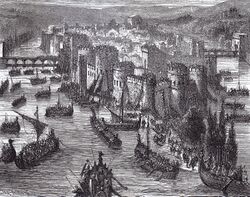Sacking of Umudin
| Sacking of Umudin | |||
|---|---|---|---|
| Part of The First Kopen Uprising | |||
 Artists' rendition of the Sacking of Umudin in 1324. | |||
| Date | 1325 | ||
| Location | |||
| Caused by | The city of Umudin had been placed under siege by Kopenist revolutionaries during the First Kopen Uprising. The desperation of the heretics resulted in the pillaging of the lands in and around the city of Umudin. | ||
| Goals | Surrender of the Umudin inner garrison | ||
| Methods | Looting, Siege, Wartime sexual violence | ||
| Status | Siege relieved by reinforcing Southern Ivili troops in 1325; Kopenist armies dispersed or annihilated. | ||
| Parties to the civil conflict | |||
| Lead figures | |||
| |||
| Number | |||
| |||
| Casualties | |||
| |||
The Sacking of Umudin was a military siege orchestrated by members of the Kopenist army of 1320 under Jonnas Moska. The siege itself was a lesser part of the greater Black Purge. During the siege, thousands of Kopenist separatists surrounded the city, ransacking the various adjacent settlements that the city relied on for sustenance, rendering it without an ample food supply. The cities food reserve dwindled quickly as crime became rampant shortly after the siege began. This is likely because any form of authority became preoccupied in the cities defense, forcing the civilian populous to defend for themselves; a task in which they failed miserably. The Kopenists constructed a naval blockade of the cities port, preventing the flow of much-needed supplies by sea. These various factors dealt a devastating blow to the populations morale, leading to many resorting to mutiny. Many began to rally in the streets in protest against the cities' overlordship, declaring that they demanded a surrender.
Part of a series on the |
|---|
| History of Kopen |
 |
| Kopenist Revolutionaries |
During the Siege
This surrender never came, however, as the cries of the people were muffled by reports of an incoming Southern Ivili army, expected to relieve the siege and the occupation of the entire province in just a few months more. It would be during these next few months that the city suffered the most; an unignorable deficiency in ample supply caused a widespread famine, leading to the deaths of hundreds. After just a few weeks, the thin corpses of those who had succumbed to starvation littered the streets as the grave keepers were too weak to dig a sufficient amount of graves. It is around this time that looting and violence became rare, as at this point there was nothing left to loot. The city had been utterly stripped of its value and remained little more than a hollow carcass of its former self. The situation in the Umudin during the siege can only be described as one of the worst logistical crisis' in Stonish history.
Aftermath
It is believed that following the relief of the siege, the Southern Ivili troops that entered the city to restore order and authority were taken aback by the cities state. The smell of the air was reportedly rancid and the city lacked any level of sanitation; aside from the corpses, the streets were empty and lacked any signs of life. Buildings of all shapes and sizes had been neglected by their owners, that is, if their owners still lived. The cities many graveyards had begun to overflow, and the cities overall population, including neighboring settlements, had decreased by over 60%. At least one third of this number were those that had fled prior to the arrival of Kopenist separatists. Many would end up returning to the city following its liberation. Much like the rest of the region occupied by Kopenist forces, it would be a long time before the Umudin recovered from the damages that it sustained during the ruthless occupation of Kopenist heretics. The region had been culturally and economically devastated by the religious oppressors, leaving many traumatized permanently. Even today there remains a resentment between the Kopenist and Geologist faiths, particularly throughout the Umudin peninsula.